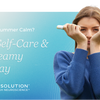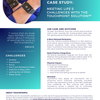6 Dimensions of Health: Sleep


Did you know that you spend 1/3 of your life sleeping? A basic function to human survival, sleep is as important as food and water when it comes to your health.
What is Sleep?
Sleep is the natural state of rest that is both active and multifaceted process. While you may be resting the night away, your brain and body stay curiously busy while you snooze. Improving brain function, sleep help neurons communicate with each other, while also removing toxins that accumulate while you are awake.
The human body cycles through five stages each night, going through two types of sleep: REM (rapid eye movement) and non-REM. You typically cycle through each stage several times a night, with increasing and longer REM periods towards the end of your sleep stretch.
Stage 1: Drowsy
If you listen to your body, your drowsy period should be 5 - 10 minutes prior to stage 2.
Stage 2: Light Sleep
You’ve just fallen asleep. During this non-REM phase of sleep, your muscles may release light twitches, as your heartbeat and breathing slows down. Your brain waves start to relax and slowdown from their daytime activity.
Stage 3: Moderate Sleep
This non-REM sleep only takes up roughly 30 minutes during its phase of the sleep cycle. Your heart rate and breathing slows, as your muscles begin to relax and body temperature drops. There are brief spurts of electrical activity in the brain, as you prepare to enter the next stage.
Stage 4: Deep Sleep
This phase of non-REM sleep is the most vital to feeling good and refreshed when you wake. Your brain waves are extremely slow, as your heartbeat and breathing are also the slowest, they’ve been in the sleep cycle. If someone was to wake you, it would prove difficult as your muscles and body is extremely relaxed.
Stage 5: REM
REM is the busiest part of the sleep cycle. Your brain wave activity, heart rate, blood pressure and breathing are increased and similar to that when the body is awake. Your eyes are rapidly moving from side-to-side beneath the eyelids, as your arm and leg muscles become temporarily paralyzed to keep you from acting out your vivid and busy dreams.
Why do you need it?
Your most basic need for sleep is to survive. Without sleep, your immune system and nervous system become seriously deprived. Sleep deprivation can cause serious harm to both your mental and physical health. Research has shown that continued lack of sleep, or poor-quality sleep, can increase your risk for depression, anxiety, stress, obesity and cardiovascular disease, among others.
In addition to long-term health, your short-term health is also impacted by lack of sleep. Going too long without sleep or not sleeping enough in a 24-hour day can create cognitive impairment. Not only will you have a difficult time making sound decisions, your coordination, reaction time and judgement can be affected, very similar as to consuming too much alcohol.
The term beauty sleep isn’t too far-fetched. Effecting nearly every tissue and cell in your body, sleep improves mood, heart health, immune function, lungs, heart and boosts metabolism. Sleep also increases moisture level and PH levels in the skin, leaving you with a radiant, beautiful glow.
How can you ensure you’re getting enough sleep?
As an adult, your overall minimum required sleep is 7 – 9 hours, while children require 10 – 12 and babies 16! And while it may be easier for children and babies to get enough sleep, it can prove difficult for adults who have a to-do list a mile long, full-time jobs and thousands of other responsibilities. Like most items on your health journey, getting enough sleep takes work.
Lifestyle Tips to Getting Enough Sleep:
- Avoid caffeine in the afternoon and evening, experts suggest cutting caffeine at 3pm
- No TV, cell phones or other electronics at least one hour before bedtime
- Create a relaxing routine with a warm bath or shower and comfy pajamas
- Make bedroom a dark and inviting space cool temperatures
- Use essential oils and your TouchPoints to put you in a relaxed state and ready to surrender
Learn more
Take our Personality Stress Profile to get your sleep profile today and resources necessary to improve your sleep patterns tonight!
Find out more about the Six Dimensions of Health >>>




